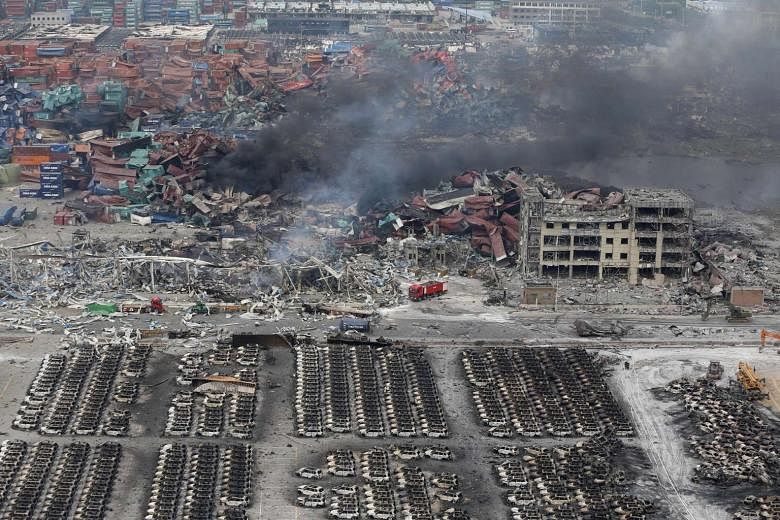TIANJIN, China (Reuters) - Chinese fire fighter Xu Qu was one of the first on the scene of a blaze at a port warehouse, but soon noticed the water he was spraying on to the fire seemed to be having a very odd effect.
Mr Xu said he had no idea what materials were stored at the warehouse in the north-eastern city of Tianjin. All he knew was that the water was not putting the fire out.
Far from it. "If anything, it was making it bigger," Mr Xu told Reuters as he sat in a fire truck on a closed-off road.
Abandoned apartments blocks lined the street, their windows shattered when two huge blasts engulfed the area late on Wednesday, killing over 100 people and injuring hundreds.
What Mr Xu and his fellow fire fighters did not know was that volatile chemicals were stored in the warehouse and the water they poured into it could have been a critical mistake.
The warehouse, designed for dangerous and toxic chemicals, was mainly storing ammonium nitrate, potassium nitrate and calcium carbide, according to the police.
Chemical safety experts say calcium carbide can turn into an explosive gas if doused with water. That could have then detonated the ammonium nitrate.
The lack of awareness about the chemicals as well as the safety protocols in dealing with them illustrate how ill-prepared the fire fighters were.
The uncertainty over what chemicals were stored also shows the gaps in oversight of the warehouse.
Asked what it felt like to be fighting the blaze, Mr Xu, in his 20s, said: "I don't know how to describe it to you. It was such a huge fire. I've never seen anything like it."
Two other fire fighters said it was only after the explosions that they switched from water to foam, although they said they did not know if water had contributed to the disaster.
Two days later, officials say they are still not sure what chemicals were stored in the warehouse or in what quantities, saying only that the storage area was a "transfer" facility.
"The goods unloaded here were only stored temporarily," said Mr Gao Huaiyou, deputy director of Tianjin's Administration of Work Safety.
He said he was trying to reconcile information from the company that operated the warehouse with data on customs forms.
He did not elaborate.
State news agency Xinhua identified the owner of the warehouse as Tianjin Dongjiang Port Ruihai International Logistics. Phone numbers listed on its website were disconnected and an email to the company went unanswered.
The first blast occurred about half an hour before midnight on Wednesday, about 24 minutes after the first team of fire fighters arrived to fight the blaze.
The second explosion came about 30 seconds later.
According to an assessment by government environmental inspectors published in 2014, the facility was designed to store sodium cyanide.
"They've almost got a cocktail in the warehouse of the worst-case scenario," said Mr Craig Watt, General Manager of Chem-Safe Australia, a chemical safety consultancy in Australia.
"If the fire brigade aren't totally clued up about the safety aspect, the worst thing you could do in a sodium cyanide fire is actually put water on it."
Despite the risks, the warehouse's operations have little regulatory oversight.
Many safety decisions - including construction of residential buildings, roads and railways close by - were left to separate government agencies that did not communicate with each other, according to a commentary published online by the overseas edition of the People's Daily, the ruling Communist Party's official newspaper.
The Tianjin government did not respond to a faxed request for comment.
The commentary was later deleted but picked up widely by many state-backed Chinese media outlets. It said the Ruihai company did not have a business licence to operate dangerous chemicals because of a regulatory loophole that allowed it to function with a licence governing port operations.
The State Administration of Work Safety, the Ministry of Environmental Protection and various other government departments regulate companies that operate dangerous materials, said Mr Cheng Qian, Greenpeace's Beijing-based toxics assistant campaign manager.
"From what we can see in Tianjin, there is no convergence between the different policies and their relevant measures," Mr Cheng said.
But even the inspections by government agencies would not address a fundamental problem - the fact that extremely dangerous materials should not be stored together.

